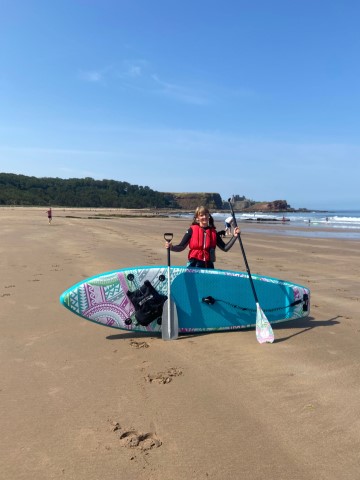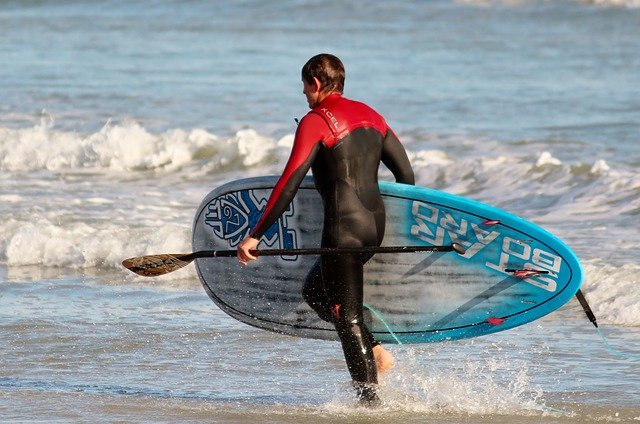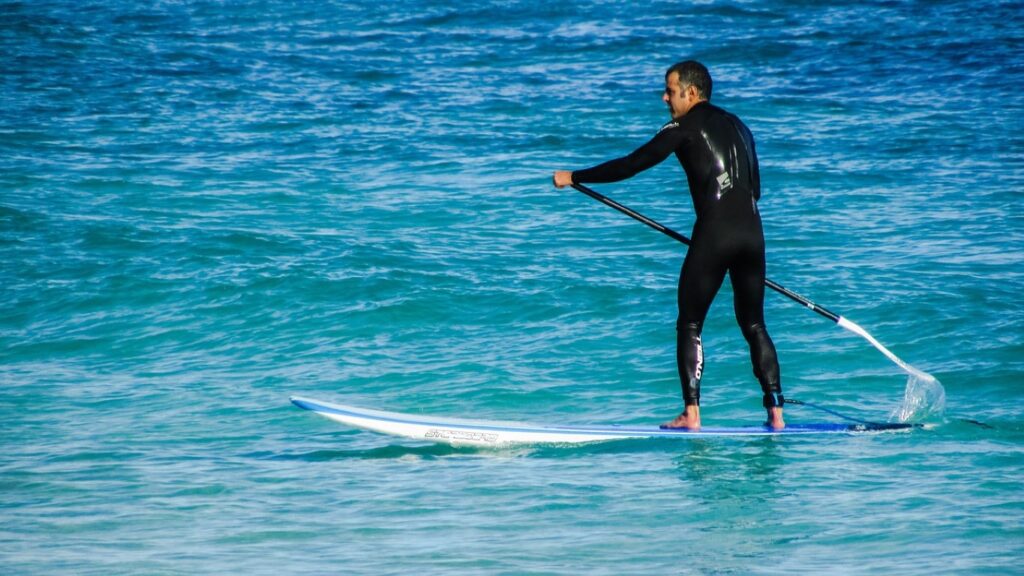Before ‘launching’ into the whole concept of open water Paddleboarding, I will answer perhaps the most commonly asked question in this regard – Is an Inflatable Paddleboard suitable for use in Ocean waters?
The quick answer is YES, it is – just pick a good quality, sturdy board, and if you are a novice to ocean Paddleboarding or kayaking, then choose a Board that is wider and longer than average as it will give you better stability overall.
Actual size does depend a little on user preference, but as a rough guide I would say an 11 foot long by 32” wide will give optimum stability.
What makes open water SUP different

There are 3 main areas of ‘play’ when it comes to Paddleboarding.
- Open water or Ocean sport
- Lakes and reservoirs
- Rivers, canals and water courses
Each one of these water-arenas presents its own challenges or opportunities to have a great day out on the water!
The one thing that sets the open-water challenge apart from the rest, and makes safety a particular concern, is the tide. Couple this with an off-shore wind or a rip current pulling you out to sea, and you can find yourself in real difficulty.
True, you can have tidal waters on a salt-water lake for example. However this is generally not near as big a deal as you may face on the open Ocean.
So am I saying that open water Paddleboarding is dangerous? Not at all – at least inasmuch as water sports overall carry with them an inherent danger unless you are well prepared.
What to take into account before launching into the open Ocean.
Safety Considerations
- Flotation device: Be sure to have on your flotation device or life jacket. Most Paddleboarders just choose the flotation device, but be aware that this is only designed to keep you afloat whilst conscious and alert enough to keep your face out of the water.
- Tether: Have your tether or leash attached to the board then your ankle or waist – you DO NOT want to lose your Paddleboard whilst on open Ocean should you fall off – it will quickly disappear from view especially in strong wind or tide. Bear in mind that you are far more likely to fall off in Open ocean waters mainly due to wind and tides causing waves.
- Whistle: Another important but often overlooked safety item is the whistle. Sound travels for a good distance over water, so make sure you have a good shrill safety whistle on a tether so it will not disappear down into the depths when you need it most!
- Flares: Most people would consider this ‘overkill’ but in fact if you are washed out to sea, particularly in cold miserable weather, then it could well be the addition that saves your life.
Unfortunately people have lost their life as a result of not following these safety proceedures – especially the flotation and tether advice. Be Safe – follow the guidelines!
Other important issues to consider before heading out are things like sunscreen, perhaps not the first thing that comes to mind, but important nevertheless as you can quickly become badly sunburned out at sea.

Keeping a mobile phone handy in a waterproof pouch is another important consideration, particularly if you are on our own- which is not advisable especially for novices.
Drinking water is another often-overlooked-until-it-is-too-late-item. Make sure you have adequate drinking water with you if you are planning to be on the open water for any time. Dehydration soon becomes a problem in a warm breeze in the open Ocean.
More Open-Water Paddleboarding considerations:
Weather & Tide Conditions:
Before setting out for the day always check the weather conditions forecast for that day and evening. Sounds obvious I know, but it’s amazing how this little detail can be forgotten about in the rush to get started.
The main reason to check the weather is not for the rain – but for the wind – especially an offshore wind.
Inflatable paddl boards are good, but that aside, as a general rule of thumb you never want to go into the water with an offshore wind over 10-12 mph, as it can be difficult to get back to shore, especially if you have squalls over this speed.
Strong winds usually lead to high waves and difficult paddling conditions, where you may strugggle to keep your balance.
Along with a weather check, and just as important if not more so, is the tide forecast. This is for a couple of reasons.
As a novice it is best not to leave shore on an outgoing tide. The reason is simple – you may well be quickly washed out to sea and struggle to get back again.
While I agree that it is easier to get away from shore as the tide is receding, getting back again might not be so easy!
The combination of a strong offshore wind AND an outgoing tide is a perfect recipe for disaster. Only attempt this if you are a very experienced paddleboarder and know exactly the risks involved.

A quick online search will show you the local tides, and if that is not possible then try going ‘old school’ and asking a local. Fishermen are best as they depend on their tide knowledge to catch fish and are usually happy to help out.
Launching your Paddleboard into a heavy surf or swell is not recommended for the novice as it takes a bit of practice if you want to avoid damaging the board, or yourself, in the process.
This is one area where it would be best to try it alongside and experienced Paddleboarder, or even get a few lessons from a professional.
Keep away from commercial boat lanes!
Whilst this may seem obvious, apparently it is an issue as many Paddleboarders have come to grief as they tried to cross the path of a local ferry!
General Rule of thumb – Be aware of your surroundings at all times! It is just too easy, especially on a clear calm day, to be daydreaming as you paddle – right into the path of destruction.
Apart from the collision risk, there is also the simple matter of the wake a large of fast boat can create, even from a good distance away. Perhaps choppy enough to launch you overboard.
Bottom line – Keep your wits about you – and enjoy a great day out Paddleboarding!
Recent Posts
Our latest Paddleboard adventure comes mainly thanks to driftwoodadventures! They kindly arranged the whole thing for us - which is important to us especially, as we were not sure of the...
What Fitness Level Do I Need For Stand Up Paddleboarding (SUP)?
Stand-Up Paddleboarding (SUP) is a fantastic water sport that has grown significantly in popularity in recent years. It's a fun and accessible activity that allows you to enjoy the outdoors and get...